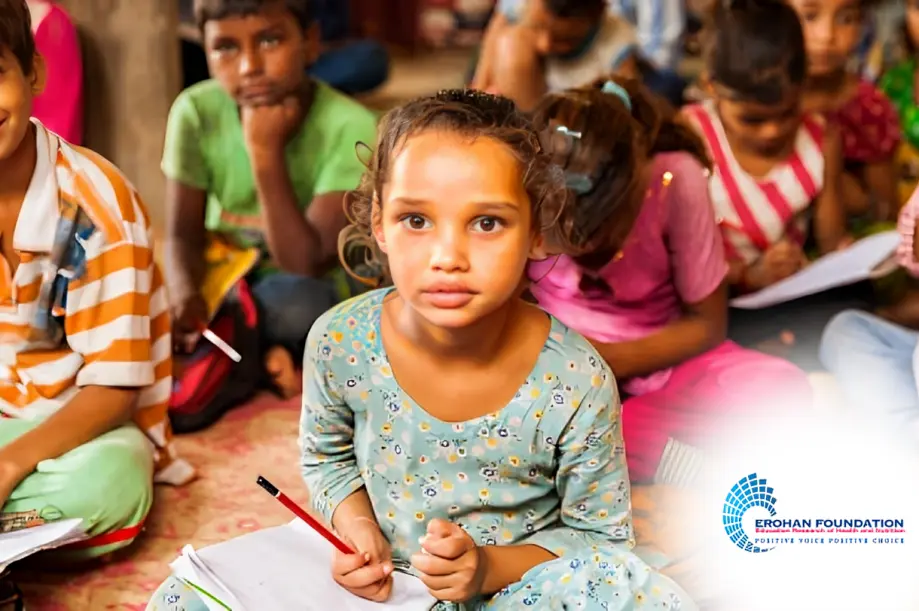Education has the incredible ability to turn lives around and create new opportunities. In India, many NGOs (Non-Governmental Organizations) are working tirelessly to make education accessible to children from various backgrounds. These organizations are driven by the belief that every child deserves a chance to learn and grow.
In this blog, we’ll explore an in-depth list of NGO working for education in all India that are making a significant impact in the field of education. Through their dedicated efforts, they are bringing hope and opportunities to countless children.
list of NGO working for education in all India
1. EROHAN Foundation
Established: 2001
EROHAN Foundation is an NGO working in importance of peer education, providing education access to non-school-going children aged between 10-18 through mobile classrooms and peer educators. They focus on rural and tribal areas where educational opportunities are limited. Their programs include interactive learning sessions and skills development programs, aimed at making education more accessible and engaging.
EROHAN Foundation also works on betterment of health outcomes and nutrition care, focusing on pregnant women and lactating mothers in remote regions.
2. American India Foundation (AIF)
Established: 2001
The American India Foundation is dedicated to transforming the lives of underserved communities through education. Their Learning and Migration Program (LAMP) addresses the educational needs of children who migrate with their families. The Digital Equalizer (DE) program brings technology into classrooms to make learning more engaging and effective.
By focusing on both immediate educational needs and long-term improvements, AIF has helped many children stay in school and achieve better academic results. Their LAMP program has given more than 15 Lakhs education opportunities in around 5000 villages.
3. Smile Foundation
Established: 2002
Smile Foundation’s mission is to provide underprivileged children with access to quality education, nutrition, and healthcare. Through their Mission Education for 3-18 years old children, they offer academic support to most vulnerable groups of society. They focus on holistic education support as well as capability building of teachers. The foundation’s work has positively impacted more than 12 Lakh children’s lives, helping them not only to stay in school but also to excel academically and personally.
4. Pratham
Established: 1994-1995
Pratham is known for its innovative approaches to improving education from early childhood to elementary level. Their flagship program, Teaching at the Right Level (TaRL), focuses on bringing children to grade-level learning, regardless of their current abilities. By using simple yet effective teaching methods, Pratham has reached millions of children across India. Their Digital Initiatives program also prepares young children with digital mediums, ensuring they start their educational journey on the right foot. The impact of Pratham’s work is visible in the improved literacy and numeracy skills of children in many regions.
5. Azim Premji Foundation
Established: 2001
The Azim Premji Foundation is a beacon of hope in the realm of education. Founded by Azim Premji, a renowned philanthropist, this foundation focuses on strengthening government schools and improving teacher quality. Their work includes setting up the Azim Premji University, which trains educators and researchers.
The Foundation’s Scholarship Program me supports girls from disadvantaged backgrounds in pursuing higher education. Additionally, they have set up nine schools across India to enhance K-12 education.
6. Aga Khan Development Network (AKDN)
Established: 1967
The Aga Khan Development Network is committed to improving education through various initiatives, including the Aga Khan Schools, which educates more than 8000 students. Their focus is on enhancing teacher capacity, supporting early childhood development, and involving communities in education. By investing in both infrastructure and quality education, AKDN has made a significant difference in the lives of children in diverse regions. Their holistic approach ensures that education reaches and benefits a wide audience.
7. KHUSHII
Established: 2003
KHUSHII stands for “Kindness, Humanity, and Understanding for Society’s Improvement.” Their work includes providing remedial education, improving school climates, and supporting infrastructure. Through programs like Swatantra Shikshaaantra and Shikshaantra Plus, KHUSHII helps children from disadvantaged backgrounds catch up with their peers academically. The organization’s efforts have led to better learning environments and improved educational outcomes for more than 90,000 children and also, they have trained 5000+ teachers.
8. CRY (Child Rights and You)
Established: 1979
CRY focuses on ensuring that every child’s rights to education, health, and protection are met. They collaborate with local communities to drive awareness on school education, promoting more new enrolments and supporting re-enrolment of dropouts as well.
CRY’s programs like Academic Support Centres, Back to School Initiative, etc aim to create a supportive environment for learning, which includes improving access to schools and ensuring that children receive the necessary support to stay in school. Their impact is seen in the increase of more than 2 Lakhs enrolment in school and more than 30,000 children reconnected with education in 2022-23.
9. Bhumi
Established: 2006
Bhumi works hard to provide top-notch education to kids who don’t have the same opportunities as others. They run school programs in Tamil Nadu that offer academic support and engage volunteers in teaching. Bhumi’s Ignite Program enhances school infrastructure through the Bhumi Fellows, School Transformation Program, creating better learning environments. Their vision is to improve academic performance and personal development among more than 5000 children and youth in the next ten years.
10. Vidya Chetna
Established: 2009
Vidya Chetna is committed to enhancing educational outcomes for marginalized children. They offer academic support, teacher training, and community engagement programs. They support students in reaching their educational dreams by offering scholarships and essential resources. Vidya Chetna’s efforts in teacher training and community involvement have led to better educational experiences and outcomes for more than 5000 students throughout 10 states in India.
The Need for Education in India: Current Scenario
Education in India faces significant challenges. Despite progress, many children still lack access to quality education due to factors like poverty, inadequate infrastructure, and societal barriers. High dropout rates and poor learning outcomes are common issues.
NGOs play a crucial role in addressing these challenges by providing resources, support, and innovative solutions to improve education. Their work helps bridge gaps and ensure that more children have the opportunity to succeed academically and build a better future.
Conclusion
These ten NGOs are shining examples of how dedication and creativity can make a difference in education. Each organization brings a unique approach to addressing the diverse educational needs in India, from improving teaching methods to supporting infrastructure and providing direct educational support.
Their efforts are helping to create a more equitable education system, where every child has the chance to learn and thrive. Through their work, they are not just teaching subjects—they are shaping futures and changing lives.


